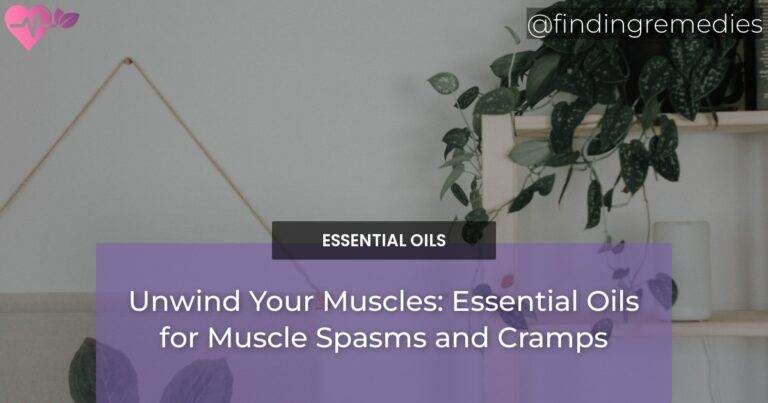Muscle spasms and cramps can be incredibly painful and debilitating, affecting our daily activities and overall well-being. If you’re seeking natural remedies to alleviate these issues, essential oils might just be the answer you’re looking for. In this comprehensive article, we will explore the best essential oils for muscle spasms and cramps, along with various techniques and blends for effective relief.
Best Oils for Spasms and Cramps
Lavender Oil
Lavender oil is renowned for its calming and analgesic properties. It can help relax muscles, reduce inflammation, and relieve pain associated with muscle spasms and cramps. Its soothing aroma also promotes relaxation and aids in reducing stress, which can contribute to muscle tension.
Marjoram Oil
Marjoram oil is known for its muscle-relaxing properties. It can help ease muscle spasms, reduce pain, and improve circulation. Its warm and herbaceous scent adds to its therapeutic benefits, making it a popular choice for muscle-related concerns.
ALSO READ
Rosemary Oil
Rosemary oil has analgesic and anti-inflammatory properties, making it beneficial for relieving muscle spasms, cramps, and soreness. It can also improve blood circulation, which aids in muscle recovery and relaxation. The invigorating aroma of rosemary oil can also help uplift your mood and enhance focus.
Using Aromatherapy for Muscle Tightness and Soreness
Benefits of Aromatherapy for Muscle Relief
Aromatherapy offers numerous benefits for relieving muscle tightness and soreness. In addition to the specific benefits provided by essential oils, aromatherapy as a whole promotes relaxation, reduces stress, and improves overall well-being. The inhalation and topical application of essential oils can have a direct impact on muscle tension and pain.
ALSO READ
How to Use Aromatherapy for Muscle Tightness
There are various ways to utilize aromatherapy for muscle tightness. You can add a few drops of essential oil to a diffuser or inhaler and inhale the therapeutic vapors. Alternatively, you can dilute the essential oil in a carrier oil and apply it topically to the affected area. This allows for direct absorption and targeted relief.
Applying Oils by Massage and Cold Compress
Massaging with Essential Oils for Muscle Relaxation
Massage is an excellent technique for relieving muscle tension and promoting relaxation. By combining the benefits of massage with the use of essential oils, you can enhance the effects and achieve greater muscle relief. Create a massage blend by diluting your chosen essential oils in a carrier oil such as jojoba or sweet almond oil. Massage the blend onto the affected area using gentle circular motions.
Cold Compress with Essential Oils for Muscle Relief
Cold compresses can provide immediate relief for muscle spasms and cramps. To create a cold compress infused with essential oils, add a few drops of your preferred oils to a bowl of cold water. Soak a clean towel in the water, wring out the excess, and apply the compress to the affected area. The combination of cold therapy and essential oils can help reduce inflammation and provide soothing relief.
Essential Oil Blends to Relax Muscles and Relieve Tension
Relaxing Muscle Blend with Lavender, Marjoram, and Rosemary
Create a relaxing muscle blend by combining equal parts lavender, marjoram, and rosemary essential oils. Dilute the blend in a carrier oil and apply it to the affected muscles. This blend not only relaxes the muscles but also promotes a sense of calm and well-being.
Tension Relief Blend with Peppermint and Eucalyptus
Peppermint and eucalyptus essential oils have cooling and analgesic properties that can help relieve tension and reduce muscle spasms. Create a tension relief blend by combining peppermint and eucalyptus oils in a carrier oil. Apply the blend to the affected area for soothing relief.
Calming Blend with Chamomile and Bergamot
Chamomile and bergamot essential oils are known for their calming and anti-inflammatory properties. Create a calming blend by combining these oils and diluting them in a carrier oil. Apply the blend to the affected muscles to promote relaxation and reduce inflammation.
Additional Tips for Muscle Spasm and Cramp Relief
Stretching and Exercise
Regular stretching and exercise can help prevent muscle spasms and cramps. Incorporate stretching routines and exercises that target the affected muscles to improve flexibility and reduce tension.
Hydration and Proper Nutrition
Staying hydrated and consuming a balanced diet is crucial for muscle health. Dehydration and nutrient deficiencies can contribute to muscle cramps. Ensure you’re drinking enough water and consuming foods rich in electrolytes and essential nutrients.
Applying Heat Therapy
Applying heat to the affected muscles can help alleviate muscle spasms and cramps. Use a heating pad, warm towel, or take a warm bath to relax the muscles and increase blood flow.
Precautions and Considerations
Patch Test and Dilution
Before applying any essential oils to your skin, it’s essential to perform a patch test to check for allergic reactions. Additionally, always dilute essential oils in a carrier oil to avoid skin irritation or sensitization.
Consulting a Healthcare Professional
If you experience persistent or severe muscle spasms and cramps, it’s important to consult a healthcare professional. They can help identify any underlying causes and provide appropriate treatment options.
Conclusion
Essential oils offer an effective and natural approach to relieve muscle spasms and cramps. Lavender, marjoram, and rosemary are among the best oils for muscle relaxation. Incorporating aromatherapy, massage, and cold compresses can enhance the benefits of essential oils. Additionally, utilizing specific essential oil blends and following additional tips can contribute to overall muscle relief. Remember to take precautions, consult a healthcare professional when necessary, and enjoy the soothing and therapeutic properties of essential oils for muscle spasms and cramps.

